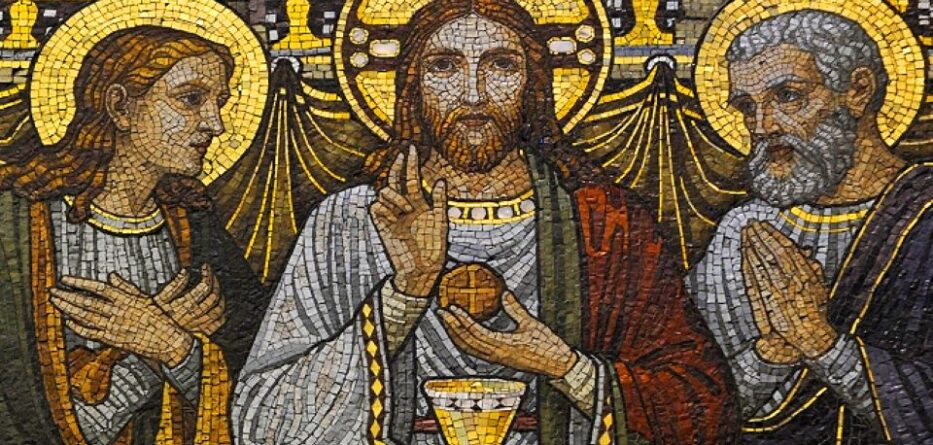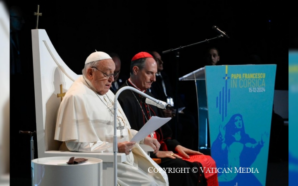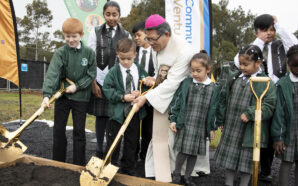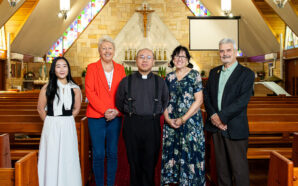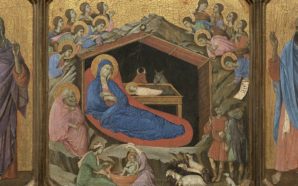Homily for the feast of Corpus Christi
Readings: Exodus 24:3-8; Psalm 116; Hebrews 9:11-15; Mark 14:12-16, 22-26
Today we celebrate the feast of Corpus Christi – the Solemnity of the Most Holy Body and Blood of Christ.
Listen at https://soundcloud.com/frank-brennan-6/homily-2624
In parishes around the world, children will be coming to church dressed immaculately, receiving their first communion and celebrating with family, including those who are not much given to coming to church. It’s a day that each of us remembers, even a lifetime later. It’s a day for leaving grievances, frustrations, and anxieties at the door. It’s a day for celebrating, even with a touch of nostalgia, the age of innocence when each of us was excited to be included for the first time in the whole family and community declaring, ‘Lord, I am not worthy that you should enter under my roof. Say but the word and my soul shall be healed.’ We then took our first tentative steps up the aisle, approaching the priest and receiving the Body of Christ, being united with our families, one as the Body of Christ.
At today’s mass, we recite the Sequence Lauda Sion:
Special theme for glad thanksgiving
Is the quick’ning and the living
Bread today before you set:
From his hands of old partaken,
As we know, by faith unshaken
Where the Twelve at supper met.
Full and clear ring out your chanting,
Joy nor sweetest grace be wanting,
From your heart let praises burst:
For today the feast is holden,
When the institution olden
Of that supper was rehearsed.
While sharing the unrequited joy of the children decked out in their finery, we are also aware that those of us who constitute the Body of Christ are living, worshipping and praying in a church and in a world where there is division and seemingly no prospect of common understanding, let alone peace and reconciliation.
During the week, I participated in the annual meeting of Catholic and Anglican clergy in my diocese. We focused on the question of how the Church is to speak on issues like Gaza where no matter what is said, passions will be stirred and the flak will fly. Is it better to say nothing? Is it possible to speak a distinctively Christian/biblical word which rises above the political/ideological dogfight?
None of us living in Australia will be in a position to do anything to resolve the crisis in Gaza. We all want peace. Here on the other side of the world we are unable to affect what is a most intractable situation. We come to communion on this feast of Corpus Christi knowing that we share the bread of life with others who hold very different views about the morality and utility of the war in Gaza, even demonising those who hold contrary views half a world away from the theatre of war. I suggested to the clergy that whatever we say or do, we should be focused on three objectives:
- Making time for constructive respectful dialogue
- Making space for living together at peace while holding diametrically opposed views about intractable conflict
- Fostering hope and leading our people in prayer despite their opposing views
Trying to make sense of the conflict and trying to find a way forward, we need to be attentive to the diverse voices – voices of experience, competence and good conscience. For example during the week, we had Judge Ahaaron Barak who had been 28 years a judge on the Supreme Court of Israel issuing another dissenting opinion on the International Court of Justice saying:
‘I do not see how Israel’s conduct could even plausibly amount to a pattern that provides the basis for inferring the specific intent required by the Genocide Convention. Why would a State that has the intention to destroy a group provide tents, humanitarian aid and field hospitals? Why would they issue warnings and build humanitarian zones?’[1]
Meanwhile Aryeh Neir, one of the founders of Human Rights Watch has written this week in the New York Review of Books: ‘I am now persuaded that Israel is engaged in genocide against Palestinians in Gaza. What has changed my mind is its sustained policy of obstructing the movement of humanitarian assistance into the territory.’[2]
These are two people who have dedicated their lives to justice and the rule of law. We will hold differing views about who is right. In good faith, we will all approach the altar this day, declaring, ‘Lord I am not worthy..’
Breaking his silence on the referendum loss during this Reconciliation Week, Noel Pearson has said: ‘that we keep making the case we belong to Australia, we belong to this nation. Our advocacy has got to be about belonging. We are part of the nation. We have nowhere else to go. This is our country and we have to keep making the case for unity and inclusion.’ He went on to say that ‘we have multiple identities. I have a traditional identity in Cape York and I speak the languages of my father and mother. I have an identity also as an Aboriginal person of Australia. I have an identity as a Queenslander. I have an identity as a Christian, not only that but specifically as a Lutheran, part of an immigrant identity shared with German migrants to South Australia. It is a mistake to reduce identity down to a single layer. And for the left that is usually a racial identity. This is identity fundamentalism and that’s the danger. When you recognise your multiple identities, then you are part of many communities with your own people but also with other people. I favour a nation that understands we have all these layers, but ultimately we share a national identity and we have to foster that.’[3]
I suspect prominent NO advocates Warren Mundine and Senator Jacinta Nampijinpa Price would agree with just about every word of that. But here we stand, a nation divided after the bitter debate last year and a crushing defeat for Noel and his fellow advocates.[4] As a eucharistic people on this feast of Corpus Christi, no matter how we voted in the referendum, and no matter what our view about the war in Gaza, we take heart from the children receiving their first communion this weekend and we pray the words of the Sequence:
When the sacrament is broken,
Doubt not, but believe ‘tis spoken,
That each sever’d outward token
doth the very whole contain.
Nought the precious gift divides,
Breaking but the sign betides
Jesus still the same abides,
still unbroken does remain.
From the start of 2024, Fr Frank Brennan SJ will serve as part of a Jesuit team of priests working within a new configuration of the Toowong, St Lucia and Indooroopilly parishes in the Archdiocese of Brisbane. Frank Brennan SJ is a former CEO of Catholic Social Services Australia (CSSA). Fr Frank’s latest book is An Indigenous Voice to Parliament: Considering a Constitutional Bridge, Garratt Publishing, 2023 and his forthcoming book is ‘Lessons from Our Failure to Build a Constitutional Bridge in the 2023 Referendum’ (Connor Court, 2024).
[1] Ahaaron Barak, Dissenting Judgment, Application of the Convention on the Prevention and Punishment of the Crime of Genocide in the Gaza Strip (South Africa v. Israel), 24 May 2024, pp. 6-7, available at
[2] Aryeh Neier, ‘Is Israel Committing Genocide?’, New York Review of Books, 6 June 2024.
[3] See https://www.theaustralian.com.au/inquirer/the-middle-east-war-has-exposed-the-sheer-depth-of-shattered-values-in-australia/news-story/886a73a5a124055b9371d1741ed34168
[4] See my address to the Sydney Institute during the week: https://www.youtube.com/watch?v=nqXMyuXGml8




